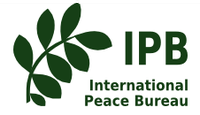International Peace Bureau

The International Peace Bureau (IPB) (French: Bureau International de la Paix), founded in 1891,[1] is one of the world's oldest international peace federations.
IPB was founded under the name Permanent International Peace Bureau (Bureau International Permanent de la Paix). From 1912 onward it used the name International Peace Bureau. Between 1946 and 1961, it was known under the name International Liaison Committee of Organizations for Peace – ILCOP (Comité de liaison international des organisations de paix – CLIOP).
The organisation was awarded the Nobel Peace Prize in 1910 "[For acting] as a link between the peace societies of the various countries".[2][3] In 1913 Henri La Fontaine was also awarded the Prize "[For his work as] head of the International Peace Bureau".[4][5] As of 2012, eleven other Nobel Peace Prize laureates have been members of the IPB.[6]
Seán MacBride Peace Prize
Established in 1992, the Seán MacBride Peace Prize is awarded by the International Peace Bureau to a person or organisation that has done outstanding work for peace, disarmament and/or human rights.[7] It is named after Seán MacBride, chairman of the IPB from 1968–74 and president from 1974-1985.[8]
- Recipients[8]
|
|
|
- 2016 IPB secretary-general Colin Archer
Nobel Peace Prize
IPB's work was rewarded by the Nobel Peace Prize in 1910, which has also been awarded to some of its members:[19]
- 1901 : Frédéric Passy (France), IPB Council Member
- 1902 : Élie Ducommun and Albert Gobat (Switzerland), first honorary secretaries of IPB.
- 1905 : Bertha von Suttner (Austria), writer and honorary vice-president of IPB.
- 1907 : Ernesto Moneta (Italy), IPB Council Member.
- 1908 : Fredrik Bajer (Denmark), honorary president of IPB.
- 1910 : IPB itself.
- 1911 : Alfred Fried (Austria), IPB Council Member.
- 1913 : Henri La Fontaine (Belgium), president of IPB.
- 1927 : Ludwig Quidde (Germany), IPB Council Member.
- 1959 : Philip Noel-Baker (United Kingdom), IPB Vice-President.
- 1962 : Linus Pauling (United States), IPB Vice-President.
- 1974 : Seán Mac Bride (Ireland), IPB Chairman and President.
- 1982 : Alva Myrdal (Sweden), IPB Vice-President.
Presidents
- Henri La Fontaine – 1907–1943[20]
- Ernst Wolf – 1963–1974
- Seán MacBride – 1974–1985
- Bruce Kent – 1985–1992
- Maj Britt Theorin – 1992–2000
- Cora Weiss – 2000–2006
- Tomas Magnusson – 2006–2013
- Reiner Braun & Ingeborg Breines – 2013–Present
See also
- Fredrik Bajer
- Élie Ducommun
- Charles Albert Gobat
- Henri La Fontaine
- Bertha von Suttner
- List of anti-war organizations
- List of peace activists
Sources
- Gobat, Albert, Développement du Bureau international permanent de la paix. Bern, 1910.
- Herz, Ulrich, The International Peace Bureau: History, Aims, Activities. Geneva, 1969.
- From Nobel Lectures, Peace 1901-1925, Editor Frederick W. Haberman, Elsevier Publishing Company, Amsterdam, 1972.
External links
| Wikimedia Commons has media related to International Peace Bureau. |
References
- ↑ "Over a Century of Peace-Making". International Peace Bureau. Retrieved 2012-02-14.
- ↑ "Award Ceremony Speech (1910)". Nobel Foundation. Retrieved 2011-10-06.
- ↑ "The Nobel Peace Prize 1910". Nobel Foundation. Retrieved 2011-10-06.
- ↑ Lundestad, Geir (2001-03-15). "The Nobel Peace Prize, 1901–2000". Nobel Foundation. Retrieved 2011-10-06.
- ↑ "The Nobel Peace Prize 1913". Nobel Foundation. Retrieved 2011-10-06.
- ↑ "IPB Nobel Prize Winners". Nobel Foundation. Retrieved 2011-10-06..
- ↑ Nordlinger, Jay (2012). Peace, They Say: A History of the Nobel Peace Prize, the Most Famous and Controversial Prize in the World. Encounter. p. 221.
- 1 2 http://www.ipb.org/web/index.php?mostra=content&menu=about%20ipb&submenu=Sean%20MacBride%20Peace%20Prize
- ↑ Fitzpatrick, Richard (2008). Where Clare Leads, Ireland Follows. Mercier. p. 78.
- ↑ Fisk, Robert (March 26–28, 2004). "The Ordeal of Mordechai Vanunu". CounterPunch. Retrieved 29 August 2013.
- ↑ "Intl Peace Bureau to award Macbride Prize to Dhanapala". LankaNewspapers.com. 11 November 2007. Retrieved 29 August 2013.
- ↑ "Dhanapala wins Macbride Prize". The Island. Sri Lanka. 8 Nov 2007. Retrieved 29 August 2013.
- ↑ Roche, Douglas (2011). How We Stopped Loving The Bomb: An Insider's Account of the World on the Brink of Banning Nuclear Arms. James Lorimer. p. 24.
- ↑ "2 North African women awarded IPS peace prize". The Nation. Pakistan. Nov 17, 2012. Retrieved 29 August 2013.
- ↑ International Peace Bureau to Award 2012 Sean McBride peach prize to Nawal El Sadaawi and Lina Ben Mhenni
- ↑ McGarry, Patsy (August 7, 2013). "Ireland criticised for not offering asylum to whistleblowers Manning and Snowden". Irish Times. Retrieved 29 August 2013.
- ↑ http://ipb.org/uploads/documents/other_docs/2DecSeanMacPrize.pdf
- ↑ http://ipb.org/uploads/documents/other_docs/SeanMacBridePrize2015.pdf
- ↑ "Nobel Peace Prize Laureates". International Peace Bureau. Retrieved 2016-03-01.
- ↑ "The Nobel Peace Prize 1901-2000". Nobelprize.org. Nobel Media AB 2014. Web. 1 Mar 2017. <http://www.nobelprize.org/nobel_prizes/themes/peace/lundestad-review/index.html>
